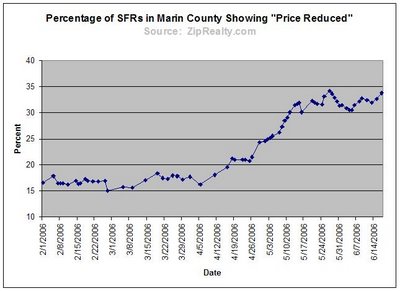 Now realtors are telling us that losing on real estate is just "a matter of perspective". Sheesh! Talk about cognitive dissonance. This article in RealtyTimes is trying to re-educate, re-program sellers to suck it up and lower the asking price because otherwise they won't be able to sell and the poor realtors won't be able to make their commission. The problem? The seller's sense of entitlement:
Now realtors are telling us that losing on real estate is just "a matter of perspective". Sheesh! Talk about cognitive dissonance. This article in RealtyTimes is trying to re-educate, re-program sellers to suck it up and lower the asking price because otherwise they won't be able to sell and the poor realtors won't be able to make their commission. The problem? The seller's sense of entitlement:When it comes to pricing your house when you're ready to sell it, keep in mind you must sell in the market you're in today. It doesn't matter what your former neighbor got six months ago, or what properties are listed for now.I liked this analogy:
The challenge is when we move from percentages to dollar amounts. If 5 percent represented $5,000, most people wouldn't blink. It’s when 5 percent represents $25,000 that sellers start to freak.
...there are stories from the field on how sellers are defending their prices as if their lives depended on it. While sellers are sitting on hundreds of thousands of dollars of equity, they can't stand the idea of dropping their price...to sell it today. The house that was $260,000 in 1999, is now selling for $569,000 today. But some sellers now want that same type appreciation and can't imagine selling it for less than $589,000. Bringing it [the price] down...seems, well, just not fair.
What’s even scarier are the agents who are defending their prices in a correcting market. They'll be the first to let you know, ‘It won't sell for what the seller’s asking,’ but they're too afraid to tell the seller the sobering news. They've just now entered a market where prices have to be corrected, dropped; improved, as it were.
The market is like playing Russian roulette. Sometimes you don't know what you have until you pull the trigger. Somebody needs to blink. Sellers seem to be saying to buyers, "I'll drop my price, just make an offer." While buyers are blankly replying, "I'll make an offer, just lower your price."Buyers: Don't give in. You are now the ones in the position of power because you have the money, inventory is high, and the cost of money has increased and will continue to increase. Yes, you want a house but no one says that you must absolutely have it today. This is a business transaction and timing matters. You have been doing just fine doing whatever it is you have been doing; keep living where ever you are currently living and wait one year; prices will come down much further, the seller's sense of entitlement will have greatly weakened, and you will get the house for a much more reasonable price. And don't forget that this is business, it's not personal so don't worry about the seller's feelings; don't give in to lame attempts at emotional manipulation (for example). Feelings are irrelevant. Only the price matters. Seller's were screwing you on the way up and they had no qualms about it. Now the table is turned and you are sitting in the seat of power. Use it to your advantage.
Sellers: Even if you don't want to sell or don't have to sell now, the fact that someone down the street is selling for a X% loss relative to their house's peak value probably means that your house is worth less on paper too. Increases in value on paper were touted and bragged about ad nauseam even though they were just "paper gains"; it works both ways . You aren't entitled to a profit especially if you bought with "investment" in mind.
The perceived loss "on paper" will affect owner's perceived sense of wealth which will translate into a real world change in spending behavior which itself will work its way down to employment. The fact is that the run-up in house prices over the last few years was due to psychology ('houses always go up', 'they aren't making any more land', 'debt doesn't matter', 'it's different this time', etc.) and not fundamental economic principles:
The recent [housing] boom, however, doesn't have the same fundamental variables [population growth, increased family size, increased income] causing prices to soar, he [Shiller] said, adding that variation in such things as building costs, population and interest rates doesn't adequately explain the reason for the housing boom.The psychology is changing. Buyers are finally starting to realize that houses are ridiculously over-priced and they are starting to question the wisdom of taking on such huge debt loads when all signs point to a declining market. Hopefully, we will return to the mind-set of the house as a place to live instead of the house as an investment and a means of making money.


2 comments:
Where's the Median Price chart? I know we don't like to show that one cause it's so soft landingish, but I like to see it anyway.
The median price chart was posted before. But anyway here it is:
http://tinyurl.com/hy2gt
Post a Comment